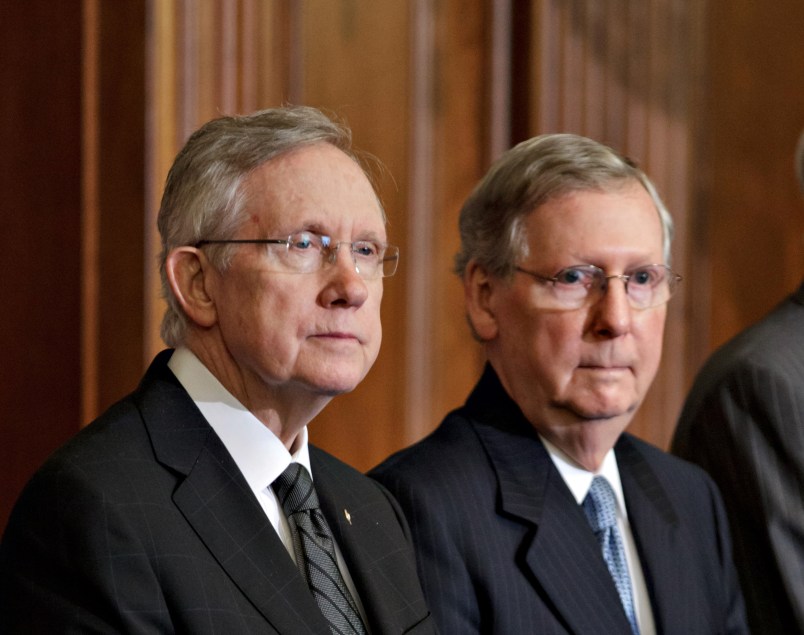WASHINGTON (AP) — Who cares which party controls Congress? Only about half of Americans. The other 46 percent, not so much, according to an Associated Press-GfK poll.
Ask people whom they would rather see in charge on Capitol Hill, and Republicans finish in a dead heat with “doesn’t matter.”
Democrats fare only a little better: 37 percent would prefer their leadership, compared with 31 percent each for the GOP and whatever.
“I’ve never really noticed any difference in my life depending on which party is in,” said Bob Augusto, 39, an oil refinery worker in Woodstown, New Jersey. He doesn’t expect to vote in this fall’s midterm election.
Nationally, Democrats have gained a modest edge since the previous AP-GfK poll in March, but it’s not because people are liking them more. Support for Democratic leadership stayed essentially unchanged in the new poll, while Republicans lost some ground to the idea that it makes no difference who wins this November.
“I think that in general people who are in Congress and people who have enough money to run for Congress are only in it for themselves,” said Jill Narushof, 52, a mother of two and part-time math tutor in Albuquerque, New Mexico, who says she’ll vote but hasn’t decided for whom. “I don’t see very many who are really interested in serving.”
Parts of the poll bode well for the GOP.
Republicans, whose party has successfully deployed its House majority to block President Barack Obama’s policies, are significantly more likely than either Democrats or independents to value control of Congress. And their base is more excited, too: Conservative Republicans are more concerned about party control than liberal Democrats are.
With Republicans making a strong push to seize control of the Senate, only a slim majority of Americans, 53 percent, say they care a good deal about which party wins.
A vast majority appear united around one thing: They’re fed up. Nearly 9 out of 10 disapprove of Congress. Two-thirds want their current representative voted out, the AP-GfK poll shows.
And most — 56 percent — disapprove of the way Obama is doing his job.
Still, history suggests most people won’t go to the polls to decide who runs Congress during the last two years of a presidency marked by remarkably bitter standoffs between the two political parties. Midterm elections usually draw about 40 percent of eligible voters.
Most incumbents won’t face a serious threat for re-election. The Republican Party is widely expected to keep control of the House. A handful of hot races are likely to determine whether Republicans take the Senate away from Obama’s party.
Because contests for the House and Senate are fought district by district and state by state, and only a third of Senate seats are involved in this year’s election, nationwide polls are of limited utility in predicting who will take the legislative majorities.
Overall, those who care a good deal about party control are evenly split between the Democrats and the Republicans. More than 8 in 10 of these people say they always or nearly always vote.
People who say it doesn’t matter so much are nearly twice as likely to be Democrats as Republicans, and they skew younger. Their indifference to the national stakes doesn’t necessarily mean they will all stay home on Election Day: 4 out of 10 say they usually go to the polls.
A big majority of political independents fall into this whatever group.
Nick Crider, a Princeton, New Jersey, chemist who co-founded his own biotechnology company, says he’s lost faith in the major parties and doesn’t care which wins.
“I feel like rhetorically it makes a difference, but in actual politics and policy? Not really,” said Crider, 25, whose politics run libertarian.
“If I don’t know much about the people running in a race, I just always vote against the incumbent,” he said. “I assume change is good.”
The AP-GfK Poll was conducted May 16-19 using KnowledgePanel, GfK’s probability-based online panel designed to be representative of the U.S. population. It involved online interviews with 1,354 adults and has a margin of sampling error of plus or minus 3 percentage points for all respondents.
Respondents were first selected randomly using phone or mail survey methods and were later interviewed online. People selected for KnowledgePanel who didn’t otherwise have access to the Internet were provided with the ability to access the Internet at no cost to them.
___
Associated Press News Survey Specialist Dennis Junius contributed to this report.
___
Online:
AP-GfK Poll: http://www.ap-gfkpoll.com
___
Follow Connie Cass on Twitter: http://www.twitter.com/ConnieCass
Copyright 2014 The Associated Press. All rights reserved. This material may not be published, broadcast, rewritten or redistributed.







This just shows how well the repubs have done with controlling the media. How could anyone not see the difference between the two parties? How could women not see how the repubs want to send them back to the 1950s and early 1960s? This has been going on for 30+ years and are we now going to lose it all? The sadness I feel has no words.
“If I don’t know much about the people running in a race, I just always vote against the incumbent,” he said. “I assume change is good.”
Because spending a half hour to acquaint yourself with their policy positions is just asking too much of a citizen.
Or you’re a lying sack of shit about your politics when your twitter feed retweets Donald Trump wisdom and contains this gem of an original thought:
“It pleases me a very great deal that apple does guerilla advertising with Limbaugh.”
https://twitter.com/placidness
Well, nearly half of all Americans are flaming idjits and proud of it.
I’ve never really noticed any difference in my life depending on which party is in
Wish I had a nickel for every time I’ve heard that.
Damn right. Being an idiot used to be something to be ashamed of. Now it’s something people proudly broadcast.